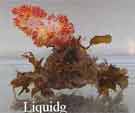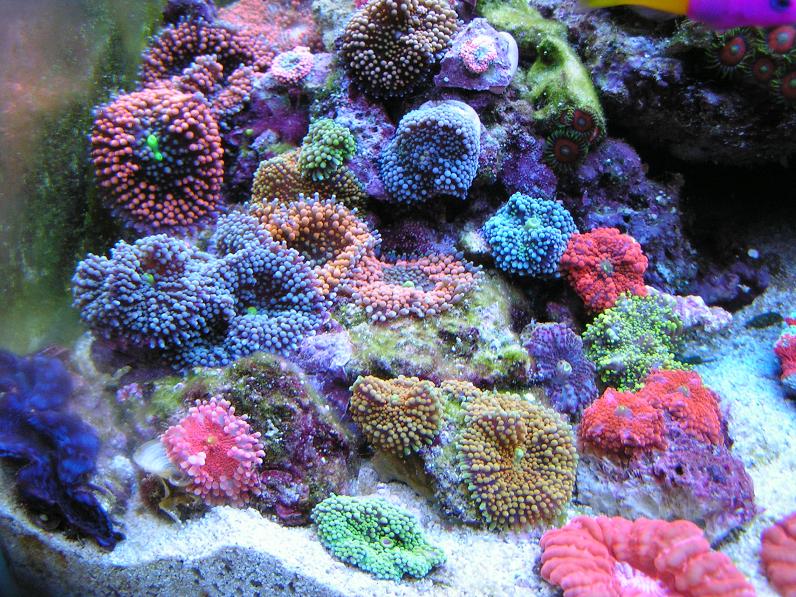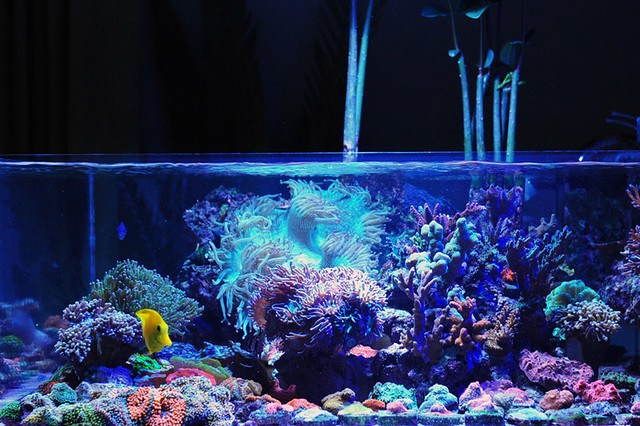Show us your Ricordea
3 posters
South East Queensland Marine Aquarium and Ocean activities Forum :: SEQMAOAF :: Marine aquarium discusion.
Page 1 of 1
 Show us your Ricordea
Show us your Ricordea
Pete started a thread on zoas earlier on, I thought I'll start a similar thread on Ricordea, my favourite coral  .
.
Overview
The Ricordea is a more colorful member of the mushroom clan, and has colors that will always attract attention. The Ricordea genus are some of the most sought after mushrooms due to their brilliance and the variety of colors available. They can fetch a hefty price if the color is intense.
There are two species assigned to the genus Ricordea: Ricordea yuma from Pacific and Indian ocean and Ricordea florida from Carribean. Ricordea yuma, unlike Ricordea florida has short tentacles on the oral cone and are typically larger than Ricordea florida.
Ricordea mushrooms are usually bright or even fluorescent in intensities. Ricordea comes in several color combinations such as orange, green, yellow, blue, and purple with some having blue, purple, or orange rings surrounding a contrasting middle color. They can also have multiple mouths (less common in R. Yuma).
Feeding
Ricordea like all mushroom corals, are photosynthetic and a majority of their nutritional requirements are obtained from the symbiotic algae zooxanthellae hosted within each coral. They also eat plankton and smaller invertebrates, such as crustaceans and brine or mysis shrimp.
Compatibility and Social Behaviors
The Ricordea is semi-aggressive if they are near or touching another coral. They do not have a potent sting, but direct contact with another coral will still cause damage. They will cause other corals to loose tissue, recess and/or possibly die. Acroporas will not grow in aquariums with large mushroom populations. Make sure to leave 6 - 8 " between your mushrooms and other corals. Watch the growth rate since the they can overgrow and kill any nearby corals. Ricordea will tolerate their own species and usually other Mushrooms. In the wild many species of Mushroom Corals occur together in large groups. In captivity they will get along with their own species, but may not tolerate mushroom species outside their colony. Even in one genus, if the color is different or a different species, the weaker mushroom will detach and find another location. Strong water movement will cause them to detach as well.
Breeding and Reproduction
Ricordea reproduce in 4 different ways. The first three ways, asexual budding, laceration, and division/fission, are successful and commonly observed in the aquarium. Budding is where individuals are formed from particles divided off from the pedal disc. Similar to budding, laceration happens when they move slowly over the surface and leave behind small pieces that will eventually form into mushrooms. Division or fission is where an individual divides down the center and forms two animals. Sexual reproduction is where eggs and sperm are released into the water column. They unite and form free-swimming larvae which are initially plankonic, and them settle and adhere to the substrate. Sexual reproduction has not been well documented, and has not been observed in captivity. Presumably modern filtration methods are inhospitable to free swimming larvae.
Propagation
Ricordea propagates easily, yet depending on genetics, can sometimes multiply slowly in captivity. Swifter water movement may speed up propagation. Ricordea can be easily propagated in captivity by cutting individual polyps into several pieces. Placed the pieces on a gravel substrate with low water flow. They will attach themselves to pieces of gravel. Later they can then be super glued to a suitable substrate such as a reef plug. It has been stated that the warmer end of their temperature spectrum encourages reproduction.
Images
Here are some pictures of some great looking Ricordea found on the internet, followed by some of mine.
Ricordea Yuma




Ricordea Florida






Now, some of mine.
This is one that had splitted before.

This is the other clone, you can see another ric on the right in the process of splitting

Here's a top view pic of the one about to split

The next 2 pics are those that formed from budding/laceration


Now show us some pics of your Ricordea!!!
 .
.Overview
The Ricordea is a more colorful member of the mushroom clan, and has colors that will always attract attention. The Ricordea genus are some of the most sought after mushrooms due to their brilliance and the variety of colors available. They can fetch a hefty price if the color is intense.
There are two species assigned to the genus Ricordea: Ricordea yuma from Pacific and Indian ocean and Ricordea florida from Carribean. Ricordea yuma, unlike Ricordea florida has short tentacles on the oral cone and are typically larger than Ricordea florida.
Ricordea mushrooms are usually bright or even fluorescent in intensities. Ricordea comes in several color combinations such as orange, green, yellow, blue, and purple with some having blue, purple, or orange rings surrounding a contrasting middle color. They can also have multiple mouths (less common in R. Yuma).
Feeding
Ricordea like all mushroom corals, are photosynthetic and a majority of their nutritional requirements are obtained from the symbiotic algae zooxanthellae hosted within each coral. They also eat plankton and smaller invertebrates, such as crustaceans and brine or mysis shrimp.
Compatibility and Social Behaviors
The Ricordea is semi-aggressive if they are near or touching another coral. They do not have a potent sting, but direct contact with another coral will still cause damage. They will cause other corals to loose tissue, recess and/or possibly die. Acroporas will not grow in aquariums with large mushroom populations. Make sure to leave 6 - 8 " between your mushrooms and other corals. Watch the growth rate since the they can overgrow and kill any nearby corals. Ricordea will tolerate their own species and usually other Mushrooms. In the wild many species of Mushroom Corals occur together in large groups. In captivity they will get along with their own species, but may not tolerate mushroom species outside their colony. Even in one genus, if the color is different or a different species, the weaker mushroom will detach and find another location. Strong water movement will cause them to detach as well.
Breeding and Reproduction
Ricordea reproduce in 4 different ways. The first three ways, asexual budding, laceration, and division/fission, are successful and commonly observed in the aquarium. Budding is where individuals are formed from particles divided off from the pedal disc. Similar to budding, laceration happens when they move slowly over the surface and leave behind small pieces that will eventually form into mushrooms. Division or fission is where an individual divides down the center and forms two animals. Sexual reproduction is where eggs and sperm are released into the water column. They unite and form free-swimming larvae which are initially plankonic, and them settle and adhere to the substrate. Sexual reproduction has not been well documented, and has not been observed in captivity. Presumably modern filtration methods are inhospitable to free swimming larvae.
Propagation
Ricordea propagates easily, yet depending on genetics, can sometimes multiply slowly in captivity. Swifter water movement may speed up propagation. Ricordea can be easily propagated in captivity by cutting individual polyps into several pieces. Placed the pieces on a gravel substrate with low water flow. They will attach themselves to pieces of gravel. Later they can then be super glued to a suitable substrate such as a reef plug. It has been stated that the warmer end of their temperature spectrum encourages reproduction.
Images
Here are some pictures of some great looking Ricordea found on the internet, followed by some of mine.
Ricordea Yuma




Ricordea Florida






Now, some of mine.
This is one that had splitted before.

This is the other clone, you can see another ric on the right in the process of splitting

Here's a top view pic of the one about to split

The next 2 pics are those that formed from budding/laceration


Now show us some pics of your Ricordea!!!
saltz- Posts : 318
Join date : 2012-02-04
 Re: Show us your Ricordea
Re: Show us your Ricordea
I can sure see why you like them, wow  they have some great colourations.....
they have some great colourations.....
Great to see and some excellent information.....I will have to do some more searching now looking for them...do you know if there is something like them here in SEQ,( nothing specific of of course) - I can't recall having seen anything like that?
Thanks for sharing!

Great to see and some excellent information.....I will have to do some more searching now looking for them...do you know if there is something like them here in SEQ,( nothing specific of of course) - I can't recall having seen anything like that?
Thanks for sharing!
finfan- Posts : 703
Join date : 2011-08-30
Location : Brisbane QLD Ausralia
 Re: Show us your Ricordea
Re: Show us your Ricordea
I don't know if they're found in SEQ waters, but some of the LFS I go to now seems to be getting a lot of them, Atlas Aquarium at Rode Road has got a few interesting colors (pink, orange), I'm waiting for him to frag them so I can buy them. Aquarama at Stafford recently brought in quite a few of the green ones like mine. Pet City at Mt Gravatt also have a few common green ones, I think they're on specials now, 2 for the price of 1.
saltz- Posts : 318
Join date : 2012-02-04
 Re: Show us your Ricordea
Re: Show us your Ricordea
The one that has plit,is here in the south east,it looks identicle to a type with a massive area of them on a ledge at that site,i dont go there very often,the last time would have been three years ago.
I haven seen them any where else here.
I only took a few once many years ago and gave them away,they covered up to much other life.
I haven seen them any where else here.
I only took a few once many years ago and gave them away,they covered up to much other life.
_________________
Forum Admin

liquidg- Posts : 2782
Join date : 2010-02-02
Location : Brisbane bayside
 Re: Show us your Ricordea
Re: Show us your Ricordea
LiquidG, let me know if you're going to that site with the Ricordea in future, I would love to go and see the conditions where they are found in the wild.
Here's a couple of pictures of tanks with Ricordea, enjoy.
FTS of tank with the Ricordea garden at the bottom-left corner

Close-up of the Ricordea garden

FTS

Close-up

FTS

Close-up

FTS

Close-up

Here's a couple of pictures of tanks with Ricordea, enjoy.
FTS of tank with the Ricordea garden at the bottom-left corner

Close-up of the Ricordea garden

FTS

Close-up

FTS

Close-up

FTS

Close-up

saltz- Posts : 318
Join date : 2012-02-04
 Re: Show us your Ricordea
Re: Show us your Ricordea
Now they are some impressive tanks - respect !








finfan- Posts : 703
Join date : 2011-08-30
Location : Brisbane QLD Ausralia
 Similar topics
Similar topics» Show us Ya Zoa
» did antone see us at the Beenleigh show?
» RNA show fish competition in Brisbane.
» Royal Queensland Show - Pisciculture
» Sea apple or sea cucumber feeding and another dug out to show its body.
» did antone see us at the Beenleigh show?
» RNA show fish competition in Brisbane.
» Royal Queensland Show - Pisciculture
» Sea apple or sea cucumber feeding and another dug out to show its body.
South East Queensland Marine Aquarium and Ocean activities Forum :: SEQMAOAF :: Marine aquarium discusion.
Page 1 of 1
Permissions in this forum:
You cannot reply to topics in this forum
 Home
Home